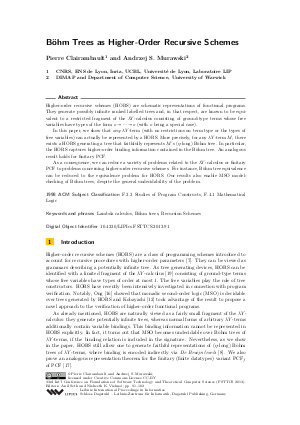Böhm Trees as Higher-Order Recursive Schemes
Authors Pierre Clairambault, Andrzej S. Murawski
-
Part of:
Volume:
IARCS Annual Conference on Foundations of Software Technology and Theoretical Computer Science (FSTTCS 2013)
Part of: Series: Leibniz International Proceedings in Informatics (LIPIcs)
Part of: Conference: IARCS Annual Conference on Foundations of Software Technology and Theoretical Computer Science (FSTTCS) - License:
 Creative Commons Attribution 3.0 Unported license
Creative Commons Attribution 3.0 Unported license
- Publication Date: 2013-12-10
File

PDF
LIPIcs.FSTTCS.2013.91.pdf
- Filesize: 0.61 MB
- 12 pages
Document Identifiers
Subject Classification
Keywords
- Lambda calculus
- Böhm trees
- Recursion Schemes
Metrics
- Access Statistics
-
Total Accesses (updated on a weekly basis)
0PDF Downloads0Metadata Views
Abstract
Higher-order recursive schemes (HORS) are schematic representations of functional programs. They generate possibly infinite ranked labelled trees and, in that respect, are known to be equivalent to a restricted fragment of the lambda-Y-calculus consisting of ground-type terms whose free variables have types of the form o -> ... -> o (with o being a special case). In this paper, we show that any lambda-Y-term (with no restrictions on term type or the types of free variables) can actually be represented by a HORS. More precisely, for any lambda-Y-term M, there exists a HORS generating a tree that faithfully represents M's (eta-long) Böhm tree. In particular, the HORS captures higher-order binding information contained in the Böhm tree. An analogous result holds for finitary PCF. As a consequence, we can reduce a variety of problems related to the lambda-Y-calculus or finitary PCF to problems concerning higher-order recursive schemes. For instance, Böhm tree equivalence can be reduced to the equivalence problem for HORS. Our results also enable MSO model-checking of Böhm trees, despite the general undecidability of the problem.
Cite As Get BibTex
Pierre Clairambault and Andrzej S. Murawski. Böhm Trees as Higher-Order Recursive Schemes. In IARCS Annual Conference on Foundations of Software Technology and Theoretical Computer Science (FSTTCS 2013). Leibniz International Proceedings in Informatics (LIPIcs), Volume 24, pp. 91-102, Schloss Dagstuhl – Leibniz-Zentrum für Informatik (2013)
https://doi.org/10.4230/LIPIcs.FSTTCS.2013.91
BibTex
@InProceedings{clairambault_et_al:LIPIcs.FSTTCS.2013.91,
author = {Clairambault, Pierre and Murawski, Andrzej S.},
title = {{B\"{o}hm Trees as Higher-Order Recursive Schemes}},
booktitle = {IARCS Annual Conference on Foundations of Software Technology and Theoretical Computer Science (FSTTCS 2013)},
pages = {91--102},
series = {Leibniz International Proceedings in Informatics (LIPIcs)},
ISBN = {978-3-939897-64-4},
ISSN = {1868-8969},
year = {2013},
volume = {24},
editor = {Seth, Anil and Vishnoi, Nisheeth K.},
publisher = {Schloss Dagstuhl -- Leibniz-Zentrum f{\"u}r Informatik},
address = {Dagstuhl, Germany},
URL = {https://drops.dagstuhl.de/entities/document/10.4230/LIPIcs.FSTTCS.2013.91},
URN = {urn:nbn:de:0030-drops-43644},
doi = {10.4230/LIPIcs.FSTTCS.2013.91},
annote = {Keywords: Lambda calculus, B\"{o}hm trees, Recursion Schemes}
}
